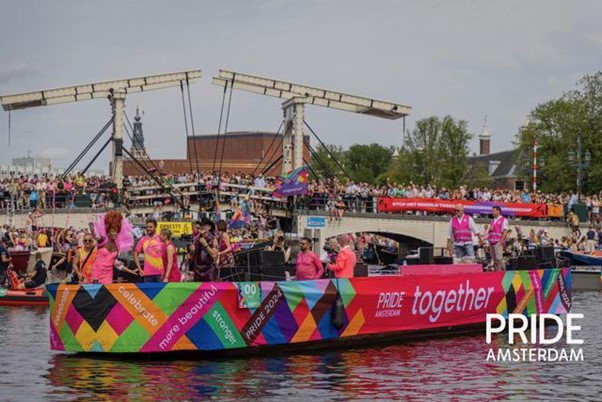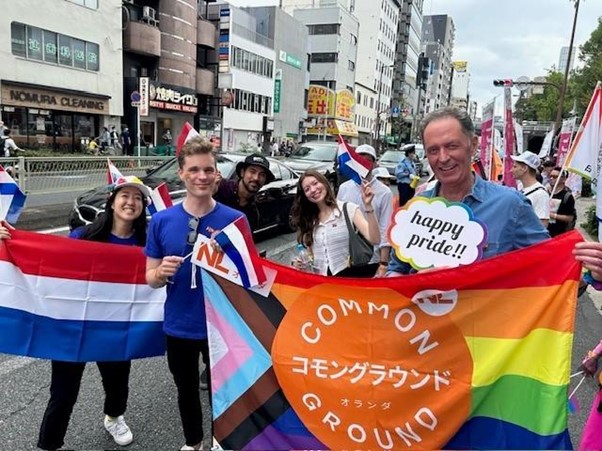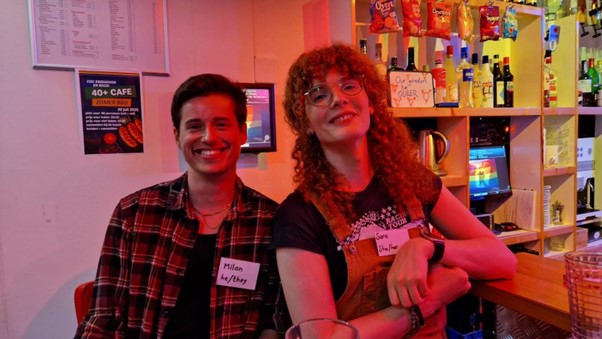The Netherlands at the Forefront of LGBTIQ+ Rights - Japan-en
The Netherlands at the Forefront of LGBTIQ+ Rights
The Netherlands made history in 2001 as the first country in the world to legalize same-sex marriage. Since then, it has been a global leader in promoting the rights and social inclusion of LGBTIQ+ individuals—lesbian, gay, bisexual, transgender, intersex, queer, and others. This commitment goes beyond legal frameworks and is deeply embedded in the country’s education system, civil society, and foreign policy.
25 Years of Marriage Equality: Amsterdam to Host WorldPride Next Year
Every summer, Amsterdam hosts the vibrant celebration of LGBTIQ+ event known as "Pride Amsterdam”. While the city is already known for its diversity and openness, the event draws participants from around the world, making it even more inclusive and colorful during this festive period.
During the nine-day festival, Amsterdam comes alive with a wide range of events, including dance parties, film screenings, panel discussions, and art exhibitions. Among the highlights is the iconic Canal Parade, where people in vibrant costumes perform and dance aboard elaborately decorated boats. This dazzling spectacle, held on the city's historic canals, has become a powerful symbol of Dutch freedom and tolerance. This year marks the 29th edition of the parade (as the 2020 canal pride was canceled due to the corona pandemic).
Next year will mark 25 years since the Netherlands became the first country in the world to legalize same-sex marriage. To commemorate this milestone, Amsterdam will host “WorldPride”, and the celebration will be extended from the usual nine days to fifteen days.
Beyond Amsterdam, Pride events and parades organized by LGBTIQ+ communities are held across the Netherlands, such as in Utrecht and Rotterdam. The movement continues to grow, spreading throughout the country.
Ongoing Efforts to Strengthen LGBTIQ+ Legal Protections
Even after the legalization of same-sex marriage, the Netherlands has continued to update its legal framework to protect the rights of LGBTIQ+ individuals as new challenges arise. Since 2014, marriage officials have not been permitted to refuse to marry same-sex couples. This legislation was introduced in response to incidents where officials declined to process marriage applications solely because the couple was of the same sex. The path to full societal acceptance of same-sex marriage has not been without its setbacks.
It has been possible to change your gender registration on birth certificates and passports etc. since 1985. Until 2014, a requirement for this was an irreversible sex-change operation, but since 2014 this has been reduced to an examination by an active medical practitioner. There are still ongoing discussions about changing the 'M (male)' or 'V (female)' on those documents to 'X', and from what age this should be possible.
In response to ongoing forms of discrimination, the Dutch government appointed a National Coordinator against Discrimination and Racism (NCDR) in October 2021. This coordinator is responsible for implementing a nationwide anti-discrimination strategy, covering the European Dutch mainland, as well as the Caribbean Netherlands.
In addition, the Dutch government supports the "Gezondheidszorg op Maat" ("Tailored Healthcare") Alliance, which shares knowledge on gender- and LGBTIQ+-sensitive healthcare. As part of the Ministry of Education, Culture and Science's anti-discrimination program, public servants who formulate policy on education, culture, media, science and academia will do more to share information with each other on discrimination against LGBTIQ+ individuals.
Speaking Out for LGBTIQ+ Equality Worldwide
Currently, homosexuality is a criminal offence in over 60 countries around the world. In 11 countries, the death penalty can be a legal consequence of consensual same-sex sexual activity. LGBTIQ+ persons are often afraid to report violence to the police. They are worried that they will be identified and ostracised as LGBTIQ+.
To promote equal rights for LGBTIQ+ people globally, the Dutch government is committed to abolish the criminalization of homosexuality, fight against discrimination, and promote the social acceptance of LGBTIQ+ individuals. The Netherlands also actively supports the cause through its membership in the Equal Rights Coalition, a partnership of 44 countries committed to advancing LGBTIQ+ rights, and by working closely with organizations that support LGBTIQ+ communities both at home and abroad.
Each year on May 17, the International Day Against Homophobia, Transphobia and Biphobia (IDAHOT), the Dutch government uses its global diplomatic network to raise awareness of the importance of equal rights for LGBTIQ+ people. The Embassy and Consulates General of the Kingdom of the Netherlands in Japan actively participate in IDAHOT initiatives and are also involved in events such as “Tokyo Rainbow Pride” and “Pride Cruise Osaka”, advocating for the fundamental principle that everyone deserves equal rights.
The World's Oldest LGBTIQ+ Organization: Building Grassroots Networks
The Netherlands is also home to COC, the world’s oldest extant LGBTIQ+ organization. Founded in 1946 by readers of a magazine for homosexuals, COC works to promote a world where everyone can be themselves in freedom and safety. The organization engages in networking and awareness-raising activities both in the Netherlands and abroad. It operates 20 regional branches across the country and supports activists in more than 35 countries worldwide.
Various sub-organizations operate under the umbrella of COC. These include groups tailored to specific communities within the LGBTIQ+ spectrum, such as Roze 50+, which focuses on people over 50, Cocktail, a network for refugees, and Autiroze, a community for individuals on the autism spectrum.
One such group is Gendermore, established in the southern Dutch city of Eindhoven. It is also part of the COC network. Since its founding in 2017, the group has held monthly gatherings on the second Saturday of each month, where 10 to 15 members come together to share personal concerns and discuss various themes. Every two months, they host a “Gender Café” at a small local café, offering a space for networking within the LGBTIQ+ community.
Milan, who leads Gendermore, explains the significance of these activities:
“There are people in the LGBTIQ+ community whose families do not accept them, or who live in small villages and feel isolated due to a lack of connection with others. For these individuals, having a space where they can share their experiences and concerns is very important.”
With the support of COC, there are also student groups called “Gender and Sexuality Alliance (GSA)”, working to create safer environments in schools. They have been established in 80% of secondary schools in the Netherlands.
The GSA provides free materials and posters to help promote understanding and acceptance of LGBTIQ+ people. It also organizes seminars and national campaigns, such as Purple Friday, held every year on the second Friday of December, when people wear purple to show support for LGBTIQ+ youth. Through these efforts, the GSA plays an active role in raising awareness within educational settings.
Continuing the Fight Against Discrimination
Through active efforts by the government and private organizations, understanding and inclusivity towards LGBTIQ+ individuals are gradually permeating Dutch society, leading some to question whether events like 'Pride' or 'IDAHOT' are still necessary in the Netherlands. However, in response to this, Dutch politician Rob Jetten shared an answer on Twitter (as it was known then) on May 17, 2020, on the occasion of IDAHOT. He revealed hateful comments that had been sent to him, as an openly gay individual. The severe discriminatory words spoken in a calm tone shocked many viewers.
According to a survey by the Dutch government, approximately one-third of discrimination reports made to the police in 2022 were related to sexual orientation. More than 10% of LGBTIQ+ people have experienced physical or sexual violence, with even higher rates among transgender at 17% and intersex people at 22%. Furthermore, the 2023 "National Program Against Discrimination and Racism" reported a sharp increase in cases of verbal abuse, intimidation, and violence directed at LGBTIQ+ people.
The protection of LGBTIQ+ human rights is still a work in progress. Continued efforts are needed in legal regulations alongside educational and public enlightenment activities. The fight against prejudice and discrimination will not end until the day comes when diversity is acknowledged and everyone can feel safe being themselves.
Written by: Naoko Yamamoto



